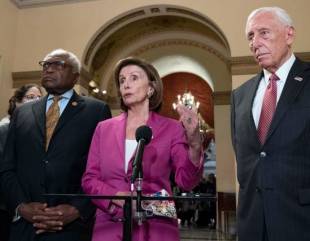After months of political wrangling, the House late Friday night passed a $1.2 trillion infrastructure bill to modernize highways, rebuild water lines and provide billions for electric vehicle charging stations, the largest transportation spending package in U.S. history.
The passage is a victory for Democrats and President Joe Biden, who had suffered a stinging defeat in Tuesday’s elections.
The bill, passed by the Senate in August, will now be sent to Biden who is expected to sign it into law.
The 228-206 vote followed bitter differences between Democratic progressives and moderates who clashed over the size and scope of Biden’s $1.85 trillion Build Back Better budget bill that would expand social safety net programs and enact sweeping climate programs. The deal Democrats struck allowed passage of the infrastructure bill Friday and a promise that the larger bill would get a vote later this month.
Thirteen Republicans voted for the bipartisan legislation while six progressive Democrats voted against due to lack of movement Friday on the Build Back Better Act.
Progressives had wanted enough assurances that moderate Democrats would back the social and climate bill before voting on the infrastructure bill. Their concern was that some more moderate lawmakers would vote for one bill and not the other, a scenario that could imperil passage because Democrats hold a very small advantage in the House.
In the end, Democrats said the prospect that the Build Back Better will finally get a vote is a game changer.
“We are on the doorstep of delivering once-in-a-generation legislation that builds on the New Deal and the promise that President Roosevelt made over 80 years ago,” Rules Committee Chairman Jim McGovern, D-Mass., said before the vote.
The infrastructure bill was the result of weeks of negotiations over the spring and summer between Republicans, Democrats and Biden. In August, the bill was approved in the Senate on a bipartisan 69-30 vote.
The bipartisan infrastructure bill would provide the largest investment in transit and water projects in history, the biggest investment in passenger railways since the creation of Amtrak and the most bridge investment since the creation of the interstate highway system, according to the White House.
The infrastructure bill would provide:
$110 billion for roads and bridges. More than 45,000 bridges nationwide are rated in poor condition. The bill also includes $16 billion for major projects that are too large or complex for traditional funding.
$66 billion for Amtrak for passenger and freight rail. The bill aims to eliminate Amtrak’s maintenance backlog and to modernize the Northeast Corridor.
$65 billion to expand broadband internet access. The White House estimated as many as 40 million Americans lack broadband access. Biden initially sought $100 billion.
$65 billion to rebuild the electric grid with renewable energy and thousands of miles of new power lines.
$55 billion to upgrade water systems, with a goal of replacing the country’s lead service pipes.
$42 billion for airports, waterways and port infrastructure. Airports would receive $25 billion.
$39 billion for public transit. The bill aims to repair and upgrade transit systems and make stations more accessible to elderly and passengers with disabilities.
$7.5 billion for charging stations for electric vehicles and $7.5 billion for electric buses.
Moderates on Friday postponed the vote on the Build Back Better Act after they wanted to wait until a Congressional Budget Office “scored” the bill’s true fiscal impact on spending and the debt.
The delay led to hours of behind-closed-door negotiations to get votes on the bipartisan infrastructure bill.
Progressives and moderates within the Democratic party both released statements late Friday to signify they’d reached a deal, based on the commitment from moderates to vote on the Build Back Better Act “in no event later than the week of November 15th.”
House Speaker Nancy Pelosi, D-Calif., on Friday said Democrats would give moderates the time and the assurances by waiting for those numbers and hope to pass it around the end of November, saying it would be a “Thanksgiving gift for the American people.”
But Republican Rep. Michael Burgess, R-Tex., said Democrats did not learn from Tuesday’s elections when Republicans did surprisingly well in gubernatorial races in Virginia and New Jersey.
“No one seemed to pay attention to when the voters spoke earlier this week and said: ‘We don’t want big government. We don’t want this creeping socialism that we’re seeing’,” he said on the floor prior to the vote. “And yet, the response of this house was to double down on that and jam through this massive bill.”
White House Press Secretary Jen Psaki tweeted the passage is “Proof that delivering for the American people is worth all the painful sausage making.”
“Clean drinking water for kids, broadband access, electric vehicles, biggest investment in public transit. It’s happening. And more to come,” she continued.

